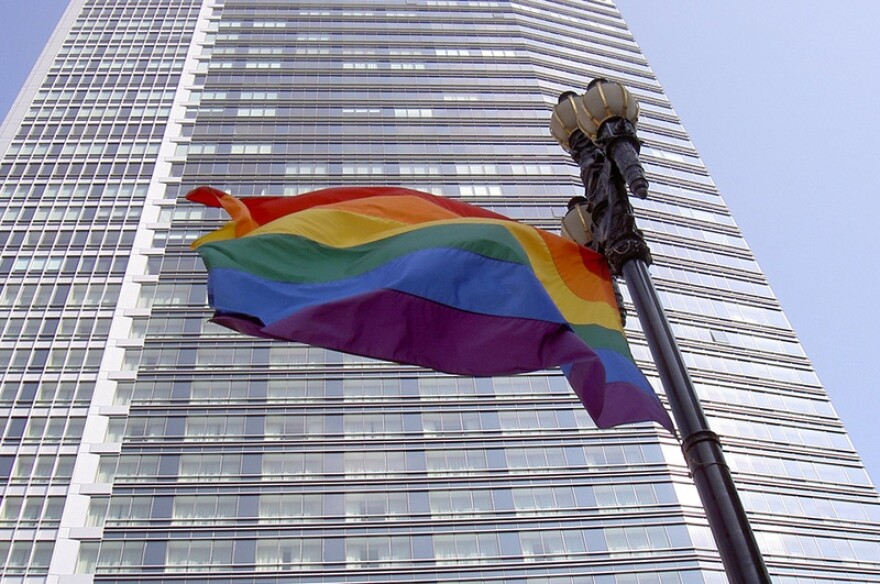When Meghan Stabler first revealed her plans for a medical and physical transition from male to female to a co-worker in 2002, she was nervous and fearful.
“I worked with Human Resources to explain my story [to the company], a secret I had lived with since I was five years old,” that she identified as a woman, not as a man, she said Thursday. "Over a 12 month period, I had conversations with other executives, my department and [company] lawyers, and it was finally OK." In 2006, as an executive at BMC Software, Stabler had surgery to become a female, with the support of her employer.
On a Friday afternoon, she left the office as a man, and on Monday she arrived as a woman. "I came into the office as me,” she said. A few weeks later, Stabler began sexual reassignment surgeries.
State Rep. Mike Villarreal, D-San Antonio, wants to ensure that others have similar positive experiences in the workplace, and he has filed HB 238, which would prohibit discrimination based on “sexual orientation” and “gender identity or expression” under the Texas Labor Code. It is the sixth consecutive legislative session in which he has filed legislation make such discrimination unlawful. The measure received four different hearings in past sessions, bouncing among several committees, but was left pending each time.
“With every session, the odds improve and it’s received better,” Villarreal said. “I do believe we’re going to have a better session than the last one.”
For the first time, a companion bill, SB 237, was filed by Sen. Leticia Van de Putte, D-San Antonio, who said she was inspired by President Obama’s inauguration speech when he invoked the civil rights milestones of “Seneca, Selma and Stonewall” to urge support for gay rights.
“When [Obama] said that our journey is not complete, I really took that to heart,” Van de Putte said. “If our federal government allows them to openly defend us on foreign shores, if they can acknowledge no discrimination for our warriors, don’t you think our civilian side should be the same?”
Opponents, however, insist that the provision will not get far in the conservative Texas Legislature.
“We don’t think it has legs,” said Laura Hoke, spokeswoman for the Texas chapter of the National Federation of Small Business. “We represent thousands of business owners and this is a non-issue.” Business owners are concerned about economic recovery and health care, she said.
But El Paso City Council Representative Susie Byrd disagrees. In 2012, a voter-approved city referendum there denied health coverage for domestic partners of city employees. The measure was eventually overturned by the council, but the damage was already done for El Paso businesses, Byrd said.
“I was hearing from fairly significant business owners in the community...that this was crippling,” Byrd said. “They would say, ‘What a way to not get any more job investment. Maybe we should pick up and run.’”
In 2001, El Paso had experienced rejection based on worries about the city's attitude toward homosexuals. Gap Inc. chose to open administrative offices in Albuquerque instead of El Paso because the city was “more embracing of people that were gay and lesbian,” Byrd said. “Some guys from San Francisco asked explicitly about [LGBT issues] and the mayor didn’t know how to answer because it’s not something that he talks about it, but there's not necessarily discrimination or bad feelings.”
On a national level, Texas is in the majority. Only 21 states extend employment discrimination protection to sexual orientation, and 16 states protect against gender identity discrimination.
“What this legislation does is follow the business model of California and New York, and most Texans agree that those models have been a failure,” said Jonathan Saenz, president of the conservative group Texas Values. “Any effort to look like them is a dangerous idea.”
Supporters point to corporate America as a better example than state governments for responding more quickly to employment discrimination as an economic decision. A majority of Fortune 500 companies, an estimated 88 percent, have implemented policies that prohibit sexual orientation discrimination.
"Lawmakers need to look at the legacies they're going to leave on Texas," said Stabler, who serves as a member of President Obama's LGBT Leadership Circle. "How much longer do LGBT Americans have to wait before they're treated equally in the workplace?"




